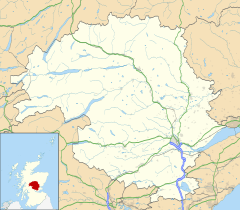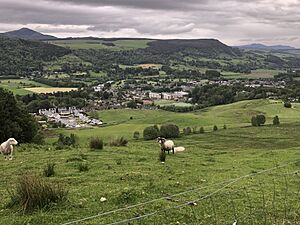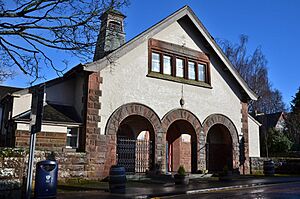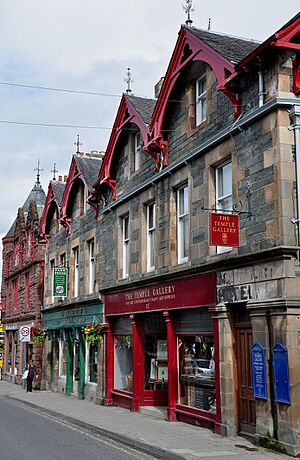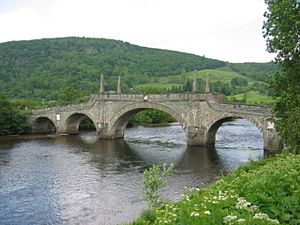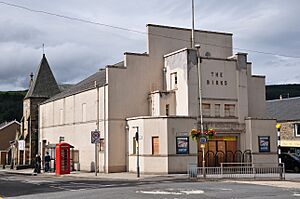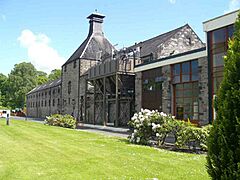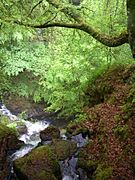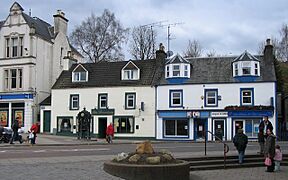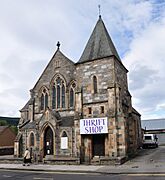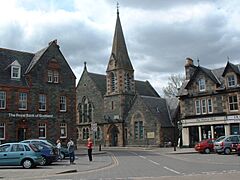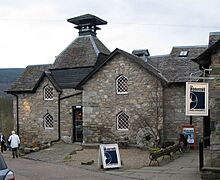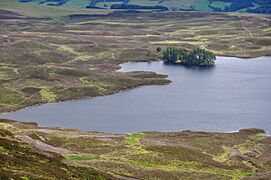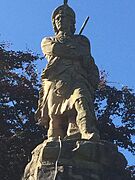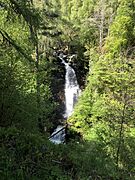Aberfeldy, Perth and Kinross facts for kids
Quick facts for kids Aberfeldy
|
|
|---|---|
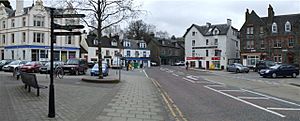 Aberfeldy centre |
|
| Population | 1,940 (2020) |
| OS grid reference | NN865496 |
| • Edinburgh | 53 mi (85 km) |
| • London | 384 mi (618 km) |
| Council area | |
| Country | Scotland |
| Sovereign state | United Kingdom |
| Post town | ABERFELDY |
| Postcode district | PH15 |
| Dialling code | 01887 |
| Police | Tayside |
| Fire | Tayside |
| Ambulance | Scottish |
| EU Parliament | Scotland |
| UK Parliament |
|
| Scottish Parliament |
|
Aberfeldy (Scottish Gaelic: Obar Pheallaidh) is a small town, also called a burgh, in Perth and Kinross, Scotland. It is located right on the River Tay. Aberfeldy is a market town found in the beautiful area of Highland Perthshire. Famous people like Robert Burns and Ed Sheeran have even mentioned it in their songs and poems.
Contents
What Does the Name Aberfeldy Mean?
The name Aberfeldy means 'mouth of the Peallaidh'. The first part, aber, is an old Pictish word that means 'river mouth'. The second part, Peallaidh, might come from the name of a water-sprite, which in Gaelic means 'shaggy'. Aberfeldy was first recorded as Abrefrally in 1526 and then as Abirfeldy in 1552.
A Glimpse into Aberfeldy's Past
Aberfeldy has a rich history. It is well-known because Robert Burns wrote about it in his poem The Birks of Aberfeldy. The town is also famous for Wade's Bridge, which was built in 1733. This bridge was designed by William Adam, a famous architect. General George Wade thought this bridge was his best work! Aberfeldy is also mentioned in a traditional song called "Loch Tay Boat Song."
The town was once home to a Royal Observer Corps bunker. This bunker was used between 1960 and 1991 in case of a nuclear attack. Today, it is still mostly there.
Aberfeldy has a special memorial for the Black Watch regiment. It also has a town square that was created in 1806. This square is a lively place with shops, restaurants, and art galleries. In 2002, Aberfeldy became a Fairtrade Town. This means it supports fair prices for goods from developing countries.
The Aberfeldy Footbridge crosses the River Tay. It is made entirely from special composite materials. This bridge is now used by people walking and cycling across the river.
Exploring Aberfeldy's Geography
Aberfeldy is located in Strath Tay, which is a valley along the upper part of the River Tay. The River Tay starts nearby at Loch Tay. It then flows south and east from Aberfeldy, eventually reaching the Firth of Tay near Perth. The land around Aberfeldy is gently rolling, perfect for farming.
Further away from town, especially to the north and west, you'll find the huge Grampian Mountains. There are many beautiful peaks like Creag Odhar, Farragon Hill, Schiehallion, Ben Lawers, and Sron Mhor.
Aberfeldy is at the crossing point of two main roads: the A826 to Crieff and the A827. The A827 leads towards the main A9 trunk road. You can easily reach Aberfeldy from the south by taking the A9 to the Ballinluig exit, then the A827.
The entrance to the Birks of Aberfeldy is just outside the town. This is a beautiful gorge and a scenic walking path. The Birks is a "Site of Special Scientific Interest" because it has many different kinds of plants and animals, some of which are protected.
Glen Lyon, which is considered one of Scotland's most stunning glens, is about 8 kilometres from Aberfeldy. There's even evidence that Roman legions built forts here over 1,600 years ago! At the start of Glen Lyon is the village of Fortingall. This village is home to the Fortingall Yew Tree, which is thought to be around 2,500 years old.
Education, Culture, and Arts in Aberfeldy
Learning at Breadalbane Academy
Aberfeldy is home to Breadalbane Academy. This school teaches children from ages three to eighteen. It offers both English and Gaelic-medium education. The nursery and primary parts of the school serve local children. The secondary school is the main one for all of Highland Perthshire. It's also the main place for Gaelic-medium education for children from many nearby villages.
The school was completely rebuilt and reopened in 2010 as a community campus. This new campus includes a library, a swimming pool, squash courts, a gym, and a cafe. These facilities are open to the public, making it a great resource for the whole community.
Places of Worship
Aberfeldy Parish Church meets in the old Breadalbane Church building. There is also a Roman Catholic church in Home Street. Other church buildings in the town are now used for different purposes. Jehovah's Witnesses also have a Kingdom Hall here.
Arts and Entertainment
Aberfeldy does not have a big theatre or music hall. However, it has two community venues, Aberfeldy Town Hall and the Locus Centre. These places are often used for music and drama events. The new Community School also has an auditorium.
The Birks Cinema was built in 1939 in an Art Deco style. It closed in the 1980s and became an amusement hall. After being empty for several years, a group called "Friends of the Birks" bought it in 2009. They worked hard to renovate it, and it reopened in 2013 as a new cinema and cafe-bar. The famous actor Alan Cumming, who was born in Aberfeldy, is a supporter of this project.
The town is also the setting for the famous poem "The Birks of Aberfeldy" by Robert Burns:
Bonie lassie, will ye go,
Will ye go, will ye go,
Bonie lassie, will ye go
To the birks of Aberfeldy!
Now Simmer blinks on flowery braes,
And o'er the crystal streamlets plays;
Come let us spend the lightsome days,
In the birks of Aberfeldy!
In 2001, the author J.K. Rowling bought a house nearby called Killiechassie House, which is on the banks of the River Tay.
Baryte Mining in the Area
North of Aberfeldy, there are large amounts of a mineral called baryte. This mineral is mostly used to make drilling fluids heavier for oil and gas wells. There are three places where this mineral can be found. The Foss Mine, about 4 miles northwest of Aberfeldy, has been working since 1984. It produces about 50,000 tonnes each year.
The largest amount of baryte, about 7.5 million tonnes, is at Duntanlich, about 6 miles north of Aberfeldy. There have been plans to mine this area, but they have not gone forward yet.
Aberfeldy's Population
In 2001, the town's population was 1,895 people. Today, Perth and Kinross Council estimates the population to be around 2,292. It is expected to grow to over 2,800 by the year 2028.
Sports in Aberfeldy
Aberfeldy has a cricket team called Breadalbane Cricket Club, which started in 1869. They play their home games at Victoria Park. The team has won several awards, including the Perthshire Cup in 2007 and 2008. The town also has a rugby union team called Aberfeldy RFC. They play in the Caledonia Midlands Four league at Wade Park.
Namesake Towns
The suburb of Aberfeldie in Melbourne, Australia, was named after Aberfeldy. The area of Aberfeldy, Victoria in Australia was also named after this Scottish town.
Gallery
See also
 In Spanish: Aberfeldy para niños
In Spanish: Aberfeldy para niños
 | Calvin Brent |
 | Walter T. Bailey |
 | Martha Cassell Thompson |
 | Alberta Jeannette Cassell |


